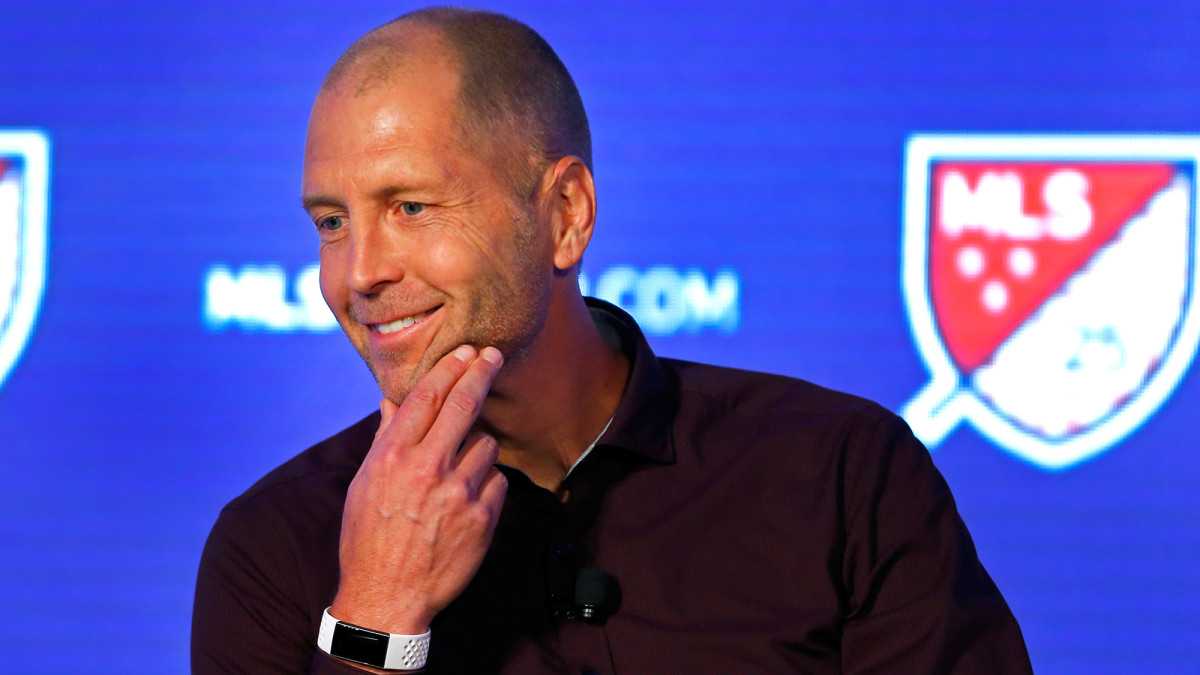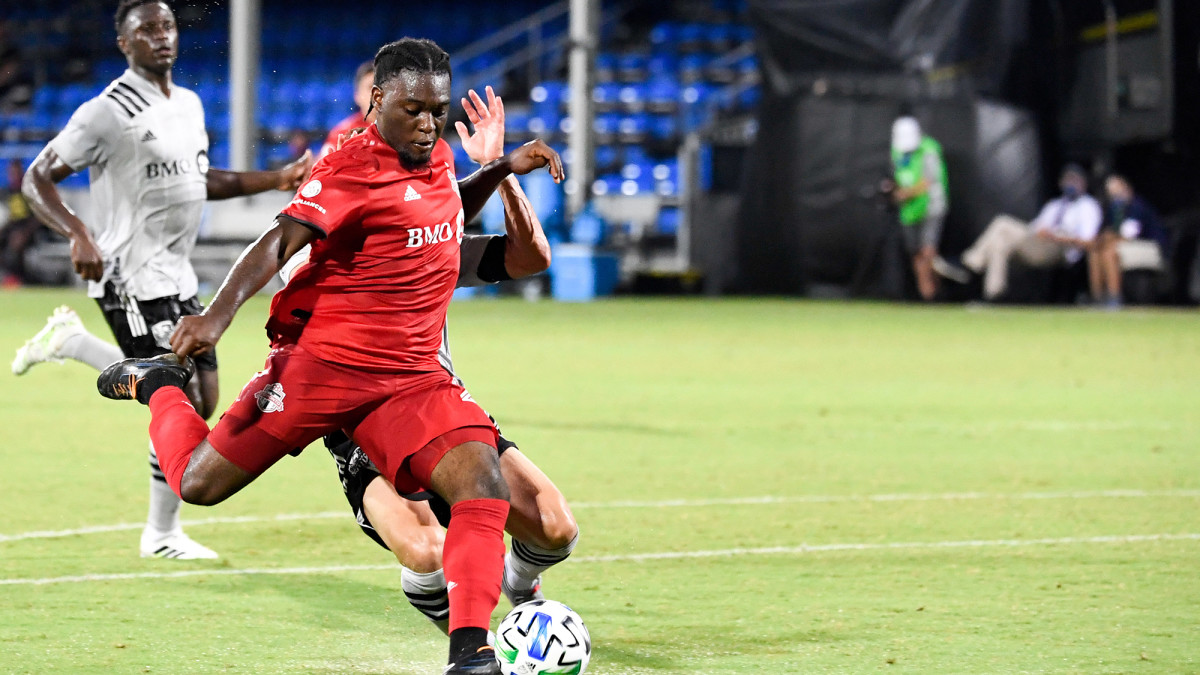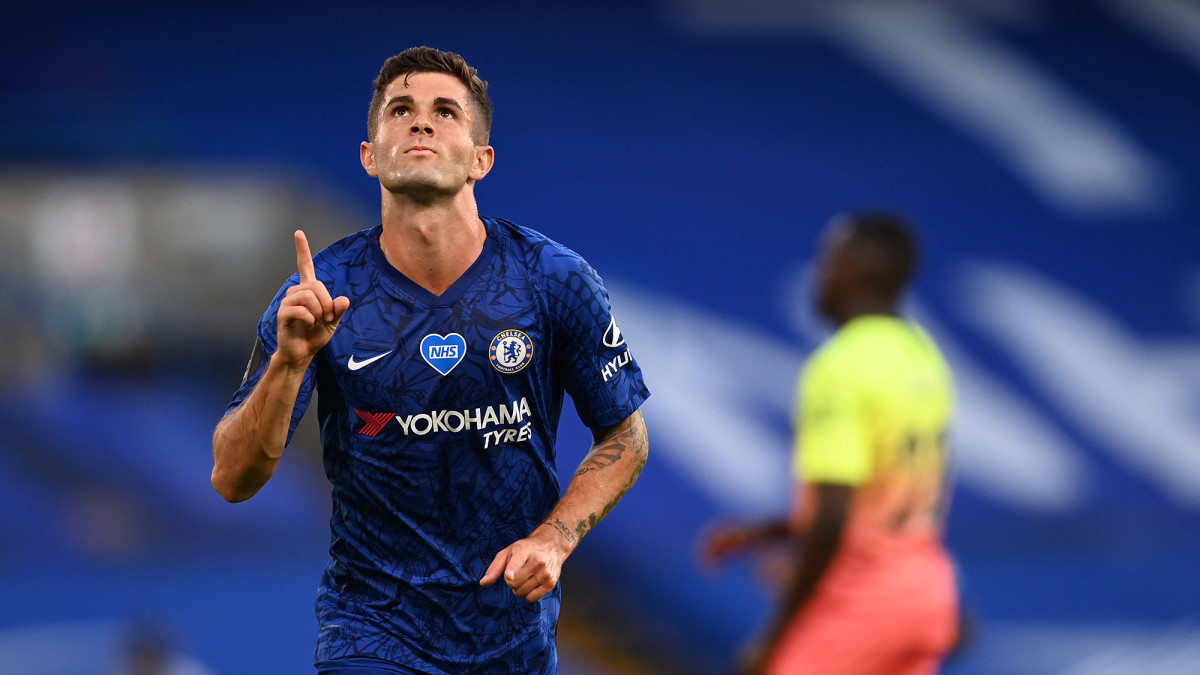Berhalter From the MLS Bubble: On Pulisic, Reyna, Akinola, World Cup Qualifying and More
Gregg Berhalter said Tuesday afternoon that he’s happy to be ensconced in MLS’s Orlando bubble watching live soccer for the first time in months, even though the long layoff, the weather, fitness levels and his field-side vantage point don’t exactly lend themselves to the most precise player evaluations. The big picture is a positive one. The return of MLS, and of most major European leagues before it, mean international matches may be just around the corner.
The U.S. men haven’t taken the field since Feb. 1. Since then, the coronavirus pandemic wiped away games in March and June and the scheduled start of World Cup qualifying in September, resulting in the program’s longest fallow period in the modern era. But the national team coach said Tuesday that he’s anticipating matches in October, with qualifying to begin soon thereafter.
“What I think is going to happen is, any day now, we should be getting word as to the qualifying format or the existing qualifying tournament staying the same,” Berhalter said during a conference call with journalists. “We don’t know the format yet. I think that’s going to dictate a lot when qualifying starts. My guess is the end of the year or the beginning of next year. I’m not sure what’s going to go in the first couple of windows.
“My guess is [the] October [FIFA window] is going to be played and it won’t be a qualifying round, so then that would be November or next year. I’m not up to date on everything. I’m sure there are conversations that are happening in Concacaf right now that I’m not aware of. But that’s my best guess.”
Concacaf was discussing the qualifying format even before the September window was wiped away. Staging the traditional 10-games-per-team Hexagonal became problematic not only because of the increasingly congested timeline, but because of the inability of several countries on the cusp of qualifying for the Hex to play matches that might boost their ranking. Concacaf president Victor Montagliani has said that starting the Hex without giving those teams a chance to earn their way in by making up games canceled in March and June would be unfair. (The USA is ranked second in Concacaf and would safely qualify).
That opened the door for an overhaul. An adjusted final round might feature more teams, fewer games per team, etc., all depending on when Concacaf could start and how many windows FIFA provides. The regional governing body also still hopes to contest its Nations League finals, which requires one window and will include the USA, Mexico, Costa Rica and Honduras.
Berhalter hinted Tuesday that he’d still like to see the Hex played.
“Even if qualifying doesn’t start in 2020, there’s plenty of time to get a Hex done. We went through the dates. There’s plenty of dates. [FIFA] already moved the intercontinental [qualifying] playoff to after the draw,” he said, adding that the Hex is “what was advertised.”
The sooner qualifying starts, the less time Berhalter will have to prepare a young team, most of which hasn’t experienced the rigors of Concacaf, and which has played only once since last November. But the sooner it starts, the more likely the Hex can be played, giving each team 10 games and a larger margin for error. An overhauled, more compressed format might leave additional FIFA windows for preparation, but would result in higher-stakes games.
“We’ll deal with whatever comes. I’m confident in that. That’s the mindset of the group. We focus on what we can control. The rest we put away,” Berhalter said. “It’s a bad situation for everyone, for every country. We’re not more disadvantaged than other countries. We actually have one benefit of having a really full 2019. We played I think the second-most games in the world, I think, in 2019. … The other thing that’s going to help is that it’s a close group. We’ve been communicating all along with the group and that’s a positive thing.”
He pointed out that the Nations League loss in Toronto last October, the low-point of Berhalter’s tenure, marked the first Concacaf road game for seven players.
“We haven’t seen this group really together,” he said. “We haven’t seen this group be tested in trialling times. We don’t know who this group is. The public doesn’t know this group yet. But as we go through qualifying and when we qualify and go to the World Cup, this group can make an impact.
“We learned a lot of lessons in 2019 and now it’s about preparing for qualifying and any other events that take place this year and in 2021 to start defining what this group is and who this group is.”
Berhalter also spent time during the call discussing individual players. He’s been keeping track of both the MLS restart and the conclusion of league seasons in Europe:

On making the most of an Orlando opportunity
The players may be hot and tired and form may be especially fickle after so many months away, but seeing how players confront challenges can be valuable for a manager, Berhalter said.
“We’re looking at how the players are dealing with adversity. Think about the conditions they’re playing in,” Berhalter said. “Just seeing how the players are processing that as individuals, how they’re able to work through that. That’s been interesting.”
Among the players he singled out was Toronto FC forward Ayo Akinola, who scored five goals in two games against D.C. United and Montreal. Berhalter called it a “great performance.”
Akinola, 20, is eligible to play internationally for the USA (where he was born), Canada (where he was raised) and Nigeria (through family). But when asked about Akinola’s international future, Berhalter drew a parallel to Ajax defender Sergiño Dest, who stuck with the USA after progressing through the junior international ranks.
“He’s meant a lot to our program,” Berhalter said, adding that Akinola would’ve played in last year’s U-20 World Cup if not for an ankle injury. “We consider him a part of our program and that means most likely the next stage for him could be the U-23s and the Olympics, and then potentially the senior national team.”
More importantly for now, however, is that Akinola and someone like Orlando City’s Chris Mueller, an unheralded 23-year-old who has three goals, stay in the moment.
“Enjoy it. Don’t think about anything else. Just enjoy the form you’re in. Not many players get that,” Berhalter said he told Akinola. “Chris is the same thing. Enjoy what your team is doing right now. … Enjoy this period. All the rest is going to come, because as these guys maintain their level and continue to perform at a high level, it’s going to give the coaching staff confidence.”
Berhalter continued, “We have the tendency to get ahead of ourselves. If we would have made the final judgement on Christian [Pulisic’s move to Chelsea] in the fall, we would’ve said he’s not performing well. But now all of a sudden, seven months later, it was the best signing ever. Same with the performance of Ayo and Chris Mueller. We’re talking about three games each, and we’re saying this is a senior national team player? We have to be careful. We have to give them time to grow.”

Berhalter also had praise for entrenched members of the national team pool like Jordan Morris, Gyasi Zardes and Sebastian Lletget, as well as young midfielders Jackson Yueill of the San Jose Earthquakes and Brenden Aaronson of the Philadelphia Union.
Then there’s Darlington Nagbe, who’s been pulling the strings for the unbeaten Columbus Crew with aplomb. Nagbe, 30, has been capped 25 times and was a favorite of Bruce Arena’s during the 2017 Hexagonal. But he’s played just once for the USA since the fateful loss in Trinidad nearly three years ago (in March 2018), and has said he prefers time with family over international duty.
Berhalter said the national team door remained open for Nagbe, but that he was going to have to be the one to step through it. Playing internationally requires proactive commitment.
“I haven’t spoken to him specifically about that, but I feel that he knows there’s an open door for him if one day he decides to commit. It is a commitment. It’s not for everyone. It’s not. There’s a lot of travel involved. You are away from your family,” Berhalter said. “I can understand him having that point of view, of not wanting to leave his family. It isn’t for everyone. But I think he also knows that it is an open door for him.”
Overall, Berhalter said he was pleased with the MLS is Back Tournament so far.
“The players have given it an amazing effort,” he said. “If you think about things we touched on before, too not being fully fit and the weather, the early games and the night games, the guys have done a great job collectively of giving a good effort in games. The entertainment value has risen. It’s been fun to see.”
Speaking of Pulisic and players in Europe...
Few American players have ever enjoyed a run of form like the one Pulisic is on at Chelsea. Since the Premier League returned from its pandemic pause (and he returned from a groin injury), the 21-year-old Pennsylvanian has three goals and three assists in seven PL games—and those are just the contributions that show up on the stat sheet. He’s been the in-form Blues’ most dangerous player.
But as Berhalter said, it took time for Pulisic to get there. It took time to adjust.
“It takes a while to adapt to a foreign league. If we go back and listen to our interviews we had in November, I was saying the same thing. We need to give him time. I think I referenced Eden Hazard at Real Madrid, how he’s having a difficult time. Players have a difficult time adapting to new countries and there was that adaptation period he needed to get over. The second part was adapting to the English game from a physical standpoint as well, and knowing how he can use his skill sets—because he has a ton of skill sets—to be most effective.”
Berhalter said he’s been especially impressed by Pulisic’s ability to find dangerous spaces in which to pick up the ball and dribble at defenders, not only on the sideline where there’s often more room, but in more congested central areas.
“If you watch the games, you can see the dramatic shift in how his teammates relate to him now,” he said. “They actually look to him, where at times in the beginning, why aren’t they passing him the ball? Now they get the ball and their first glance is to him. He’s really grown to be an important part of this group and an important part of that team and it’s been fun to watch.”

Pulisic’s ascendency as a left-sided attacker for Chelsea, especially one who’s comfortable and effective cutting inside, left Berhalter lamenting the lack of a proven, international-caliber, left-footed left back in his player pool. It’s the most significant hole on the USA roster. Dest, Tim Ream and Daniel Lovitz got most of the minutes there last year. None fit Berhalter's preferred profile.
Looking to Germany, Berhalter outlined how important a player’s club situation is in determining his career trajectory. He expressed concern for striker Josh Sargent at Werder Bremen, which staved off relegation by the slimmest of margins—an away goals triumph in a playoff—but must improve next season.
“For Josh, and I put this on the club, they need to find a way to be able to create chances in an efficient way. Right now, they’ve been really poor in the attack and that’s affecting Josh. They don’t play to get the forwards goal scoring opportunities,” Berhalter said. “He needs to get more service."
Then there’s Giovanni Reyna, who emerged as a difference maker after ascending to the Borussia Dortmund first team this spring. The 17-year-old was due to get his first senior cap in March, but the USA’s two European friendlies were canceled. Berhalter has seen enough of Reyna with Dortmund to believe he’s ready to contribute at the international level.
“Gio’s going to grow into a fantastic player. There’s no question about it. Our job is to help with that growth,” Berhalter said. “Does that mean him getting an opportunity, an early opportunity, to play in difficult games? That’s going to make him better, make him rise to an even higher level.
“Dortmund did a great job of integrating him into the group in a calculated way to help him perform at high levels,” he continued. “How do we challenge him? How do we put him in a difficult environment to help him grow as a player? He’s one of those players who will keep rising to the challenge and we need to provide him with that.”
